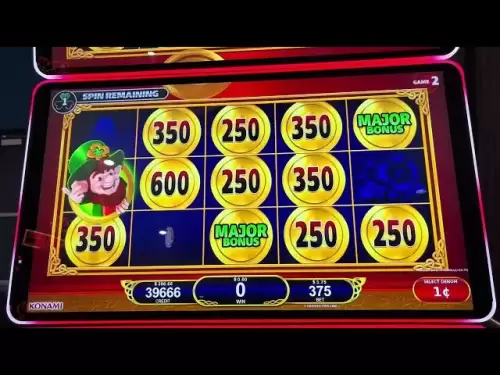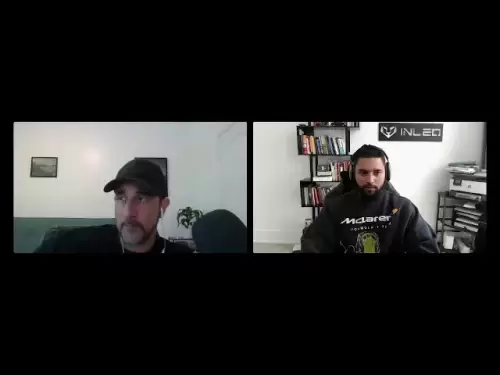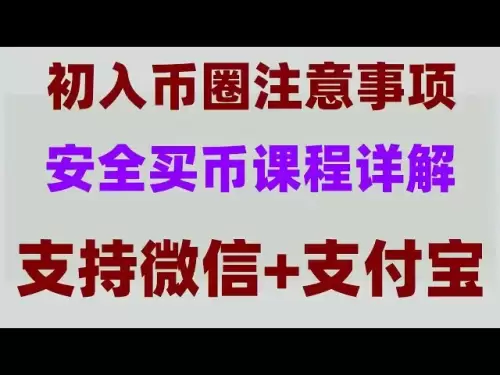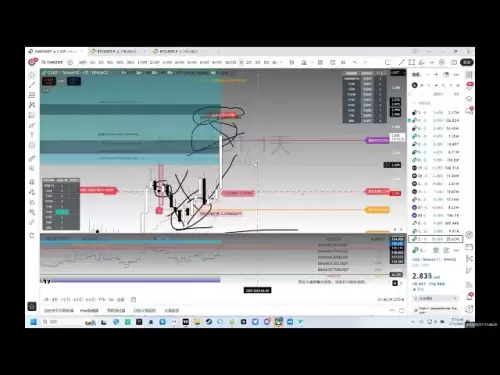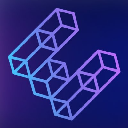-
 Bitcoin
Bitcoin $110,401.8795
1.10% -
 Ethereum
Ethereum $2,702.7130
6.50% -
 Tether USDt
Tether USDt $1.0001
-0.01% -
 XRP
XRP $2.3443
1.76% -
 BNB
BNB $691.5299
2.74% -
 Solana
Solana $178.8132
2.50% -
 USDC
USDC $0.9999
0.00% -
 Dogecoin
Dogecoin $0.2296
2.61% -
 Cardano
Cardano $0.7719
2.31% -
 TRON
TRON $0.2756
1.43% -
 Hyperliquid
Hyperliquid $37.5692
1.38% -
 Sui
Sui $3.6873
6.07% -
 Chainlink
Chainlink $16.0457
3.59% -
 Avalanche
Avalanche $23.7281
2.75% -
 Stellar
Stellar $0.2905
2.28% -
 Shiba Inu
Shiba Inu $0.0...01461
2.60% -
 Bitcoin Cash
Bitcoin Cash $420.6428
1.53% -
 UNUS SED LEO
UNUS SED LEO $8.8911
-3.26% -
 Hedera
Hedera $0.1911
3.06% -
 Toncoin
Toncoin $3.0204
2.38% -
 Litecoin
Litecoin $96.7576
2.14% -
 Polkadot
Polkadot $4.5947
3.17% -
 Monero
Monero $385.9955
-4.23% -
 Bitget Token
Bitget Token $5.3818
1.51% -
 Pepe
Pepe $0.0...01415
3.58% -
 Pi
Pi $0.7508
-2.74% -
 Dai
Dai $0.9997
-0.01% -
 Ethena USDe
Ethena USDe $1.0007
0.00% -
 Aave
Aave $277.9972
4.61% -
 Uniswap
Uniswap $6.5957
3.07%
How does the DAO organization operate? Quickly understand decentralized autonomy
DAOs use blockchain and smart contracts to automate decisions without central authority, allowing members to vote on proposals and manage funds transparently.
May 26, 2025 at 10:56 am
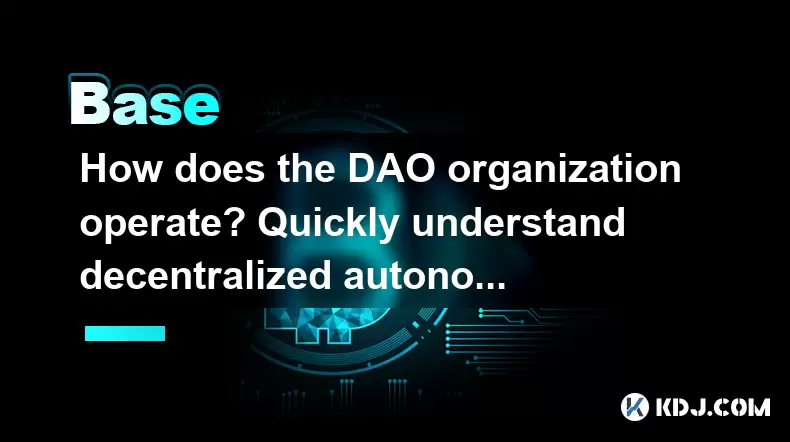
Decentralized Autonomous Organizations (DAOs) represent a revolutionary approach to organizational management and decision-making within the cryptocurrency and blockchain ecosystem. DAOs are essentially organizations that operate on blockchain technology, using smart contracts to automate and enforce rules and decisions without the need for centralized authority. This article will delve into the mechanics of DAO operations, helping readers quickly grasp the concept of decentralized autonomy.
What is a DAO?
A DAO, or Decentralized Autonomous Organization, is a collective of individuals governed by rules encoded as computer programs called smart contracts. These smart contracts run on a blockchain, which ensures transparency and immutability of the organization's operations. Unlike traditional organizations, DAOs do not have a central authority; instead, governance is distributed among its members, who can vote on proposals and decisions affecting the organization.
How DAOs are Formed
The formation of a DAO begins with the creation of a smart contract on a blockchain platform, such as Ethereum. This smart contract outlines the organization's rules, governance structure, and operational mechanisms. Once the smart contract is deployed, individuals can join the DAO by acquiring tokens, which represent their voting power and ownership within the organization. The initial setup of a DAO requires careful planning to ensure that the rules and mechanisms are robust and secure.
Governance and Decision-Making in DAOs
Governance in a DAO is a critical aspect that distinguishes it from traditional organizations. Members of a DAO participate in decision-making through a voting process. Proposals, which can range from changes in the organization's rules to financial decisions, are submitted to the DAO and voted on by token holders. The voting mechanism can vary, but typically, it is proportional to the number of tokens a member holds. This democratic approach ensures that decisions reflect the collective will of the members.
Operational Mechanisms of DAOs
DAOs operate through a series of automated processes facilitated by smart contracts. When a proposal is approved, the smart contract automatically executes the decision. This can include transferring funds, updating the organization's rules, or initiating new projects. The automation of these processes reduces the need for intermediaries and increases efficiency. Additionally, all transactions and decisions are recorded on the blockchain, providing a transparent and auditable trail of the DAO's activities.
Funding and Financial Management
Funding is a crucial aspect of DAO operations. DAOs often raise funds through token sales or initial coin offerings (ICOs). These funds are then managed through the DAO's smart contract, which can be programmed to allocate funds according to the organization's rules and approved proposals. Financial transparency is a key benefit of DAOs, as all financial transactions are recorded on the blockchain and accessible to members.
Challenges and Considerations
While DAOs offer numerous advantages, they also face several challenges. Security is a primary concern, as vulnerabilities in smart contracts can lead to significant financial losses. The infamous hack of The DAO in 2016, where millions of dollars in Ether were stolen, is a stark reminder of these risks. Additionally, the legal status of DAOs remains unclear in many jurisdictions, which can complicate their operations and interactions with traditional entities.
Practical Example: The DAO
To illustrate how a DAO operates, consider The DAO, one of the earliest and most notable examples. The DAO was created to function as a decentralized venture capital fund, allowing investors to vote on projects to fund. The process involved submitting project proposals, which were then voted on by token holders. If a proposal received sufficient votes, the funds were automatically disbursed to the project. This example highlights the potential of DAOs to democratize investment and decision-making.
Joining and Participating in a DAO
For those interested in joining a DAO, the process typically involves the following steps:
- Research the DAO: Understand its purpose, governance model, and the smart contract's rules.
- Acquire Tokens: Purchase or earn tokens that grant voting rights within the DAO.
- Participate in Governance: Engage in the voting process for proposals and decisions.
- Contribute to the Community: Participate in discussions and contribute ideas to the DAO's development.
Frequently Asked Questions
Q: Can anyone join a DAO?
A: Yes, generally anyone can join a DAO by acquiring its tokens. However, some DAOs may have specific requirements or restrictions for membership.
Q: How are disputes resolved within a DAO?
A: Dispute resolution in DAOs can vary. Some DAOs use arbitration through smart contracts, while others may rely on community consensus or external legal mechanisms, depending on their governance rules.
Q: What happens if a DAO's smart contract is hacked?
A: In the event of a hack, the DAO's response depends on its governance and legal framework. Some DAOs may have built-in mechanisms to halt operations and recover funds, while others might require community action or legal intervention.
Q: Are DAOs legal entities?
A: The legal status of DAOs is still evolving. In some jurisdictions, DAOs may be recognized as legal entities, while in others, they might not have a clear legal standing, complicating their operations and interactions with traditional legal systems.
Disclaimer:info@kdj.com
The information provided is not trading advice. kdj.com does not assume any responsibility for any investments made based on the information provided in this article. Cryptocurrencies are highly volatile and it is highly recommended that you invest with caution after thorough research!
If you believe that the content used on this website infringes your copyright, please contact us immediately (info@kdj.com) and we will delete it promptly.
- $SEND to Be Listed on BitMart, a Premier Global Digital Asset Trading Platform
- 2025-05-28 02:15:13
- Neanderthal Fingerprint Found on 115000-Year-Old Pebble
- 2025-05-28 02:15:13
- Ethereum (ETH) Breaks Above $2,575 Resistance, Targeting the $2,650-$2,745 Range
- 2025-05-28 02:10:16
- DON (Salamanca) Meme Token Emerges as the Fastest-Growing Meme Bytes
- 2025-05-28 02:10:16
- XRP whales shift funds to Unilabs' booming presale, betting big on its AI-driven tech as assets top $30m and momentum builds.
- 2025-05-28 02:05:18
- Whales Accumulate PEPE as It Regains Bullish Momentum
- 2025-05-28 02:05:18
Related knowledge

What do Web3 developers need to learn? Skill tree combing
May 27,2025 at 06:56pm
Web3 development encompasses a broad range of technologies and concepts that are essential for building decentralized applications and systems. To become a proficient Web3 developer, one needs to acquire a diverse set of skills and knowledge. This article will outline the essential components of a Web3 developer's skill tree, providing a comprehensive g...
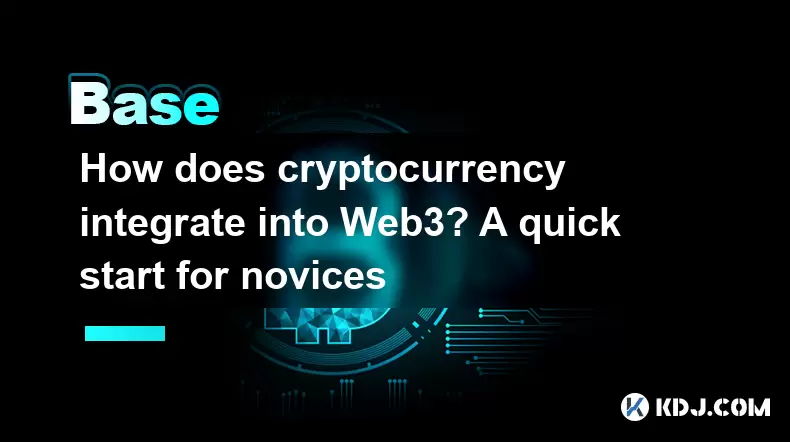
How does cryptocurrency integrate into Web3? A quick start for novices
May 27,2025 at 07:14pm
Cryptocurrency plays a pivotal role in the burgeoning world of Web3, serving as the backbone for many of its applications and functionalities. As a novice, understanding how these digital assets integrate into the Web3 ecosystem can be both exciting and essential for navigating this new digital frontier. In this article, we will explore the fundamentals...
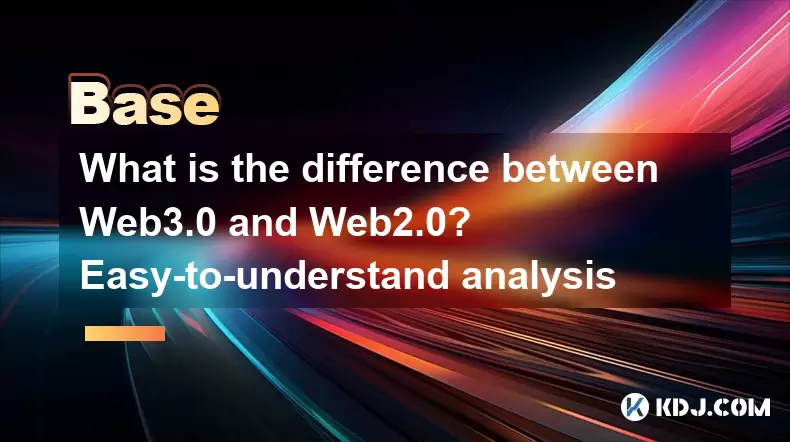
What is the difference between Web3.0 and Web2.0? Easy-to-understand analysis
May 28,2025 at 12:28am
The evolution from Web2.0 to Web3.0 represents a significant shift in how the internet functions, particularly in terms of user control, data privacy, and decentralization. Understanding these differences is crucial for anyone involved in the cryptocurrency and blockchain space. Let's dive into an easy-to-understand analysis of these two internet paradi...
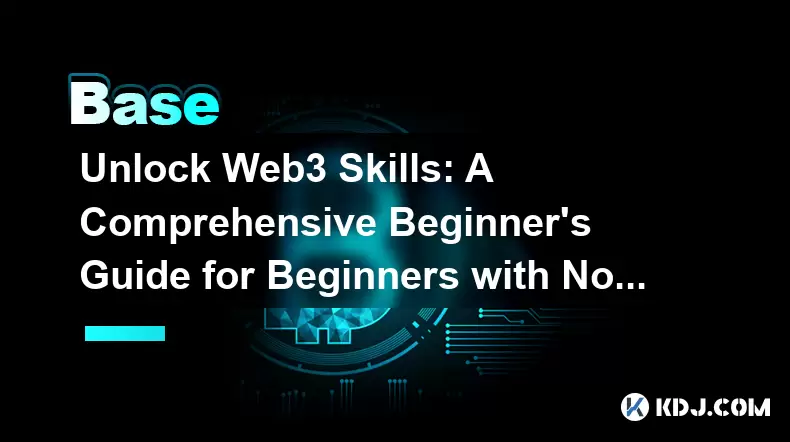
Unlock Web3 Skills: A Comprehensive Beginner's Guide for Beginners with No Basic Knowledge
May 27,2025 at 06:15pm
Unlocking the world of Web3 can seem daunting for beginners, especially for those with no prior knowledge of blockchain technology or cryptocurrency. However, with the right guidance, anyone can start to understand and engage with this innovative space. This comprehensive guide is designed to help you navigate the basics of Web3, from understanding its ...
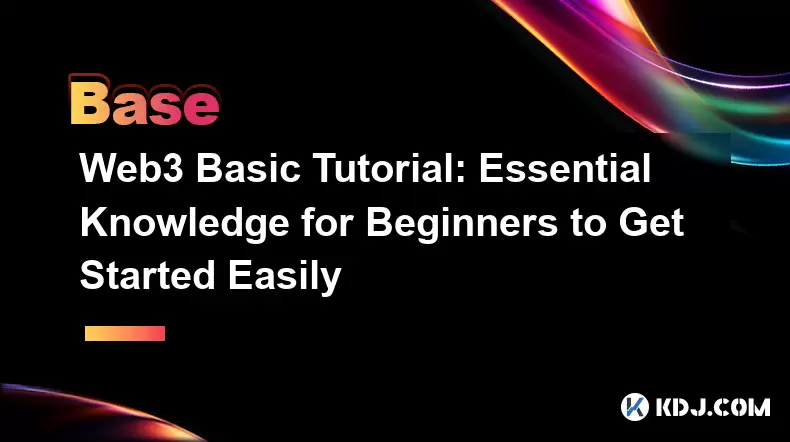
Web3 Basic Tutorial: Essential Knowledge for Beginners to Get Started Easily
May 27,2025 at 03:42pm
Web3 represents a new era of the internet, driven by blockchain technology and decentralized systems. For beginners, understanding the fundamentals of Web3 is crucial for navigating this evolving landscape. This tutorial will provide essential knowledge to help you get started easily, covering key concepts, tools, and practical steps to engage with Web3...
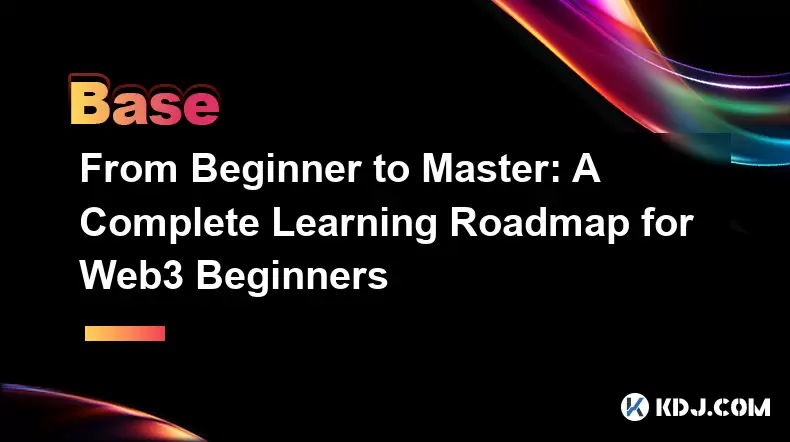
From Beginner to Master: A Complete Learning Roadmap for Web3 Beginners
May 27,2025 at 07:07pm
Embarking on a journey into the world of Web3 and blockchain technology can be both exciting and overwhelming for beginners. Web3 represents the next evolution of the internet, driven by decentralized technologies such as blockchain, which offer a new paradigm for how we interact with digital services. This comprehensive learning roadmap is designed to ...

What do Web3 developers need to learn? Skill tree combing
May 27,2025 at 06:56pm
Web3 development encompasses a broad range of technologies and concepts that are essential for building decentralized applications and systems. To become a proficient Web3 developer, one needs to acquire a diverse set of skills and knowledge. This article will outline the essential components of a Web3 developer's skill tree, providing a comprehensive g...

How does cryptocurrency integrate into Web3? A quick start for novices
May 27,2025 at 07:14pm
Cryptocurrency plays a pivotal role in the burgeoning world of Web3, serving as the backbone for many of its applications and functionalities. As a novice, understanding how these digital assets integrate into the Web3 ecosystem can be both exciting and essential for navigating this new digital frontier. In this article, we will explore the fundamentals...

What is the difference between Web3.0 and Web2.0? Easy-to-understand analysis
May 28,2025 at 12:28am
The evolution from Web2.0 to Web3.0 represents a significant shift in how the internet functions, particularly in terms of user control, data privacy, and decentralization. Understanding these differences is crucial for anyone involved in the cryptocurrency and blockchain space. Let's dive into an easy-to-understand analysis of these two internet paradi...

Unlock Web3 Skills: A Comprehensive Beginner's Guide for Beginners with No Basic Knowledge
May 27,2025 at 06:15pm
Unlocking the world of Web3 can seem daunting for beginners, especially for those with no prior knowledge of blockchain technology or cryptocurrency. However, with the right guidance, anyone can start to understand and engage with this innovative space. This comprehensive guide is designed to help you navigate the basics of Web3, from understanding its ...

Web3 Basic Tutorial: Essential Knowledge for Beginners to Get Started Easily
May 27,2025 at 03:42pm
Web3 represents a new era of the internet, driven by blockchain technology and decentralized systems. For beginners, understanding the fundamentals of Web3 is crucial for navigating this evolving landscape. This tutorial will provide essential knowledge to help you get started easily, covering key concepts, tools, and practical steps to engage with Web3...

From Beginner to Master: A Complete Learning Roadmap for Web3 Beginners
May 27,2025 at 07:07pm
Embarking on a journey into the world of Web3 and blockchain technology can be both exciting and overwhelming for beginners. Web3 represents the next evolution of the internet, driven by decentralized technologies such as blockchain, which offer a new paradigm for how we interact with digital services. This comprehensive learning roadmap is designed to ...
See all articles





















